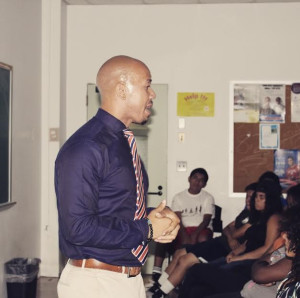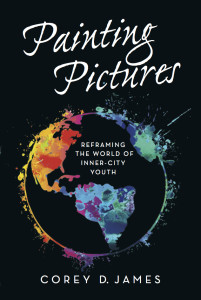NEWARK, NJ – After more than a decade dedicated to working with urban youths, mentor and activist Corey D. James is sharing the story of how his New Jersey nonprofit is reshaping the lives of young men and women and empowering them to seek brighter futures in an inspiring new book, “Painting Pictures: Re-framing the World of Inner-City Youth” releasing in April 2016.
“Painting Pictures” shares stories of success and tragedy, featuring real accounts of youth whose lives are permeated by negative influences. Growing up in disadvantaged neighborhoods, our youth learn at an early age that they have to adapt to the rules of the streets or fall victim to it. They replicate the image of their environment, resulting in the ongoing cycle of violence, drugs, incarceration and intense tragedy. James believes this cycle can be broken.
“Painting Pictures” brings readers into the harsh and complex world in which urban youth struggle, sharing their first-hand accounts of the alarming images and circumstances inner city youth must overcome.
Although their pictures look bleak, filled with disasters, frustrations and destructive emotions, James believes a greater picture can be painted. Tear-jerking testimonies pepper the book, providing an understanding that even those raised in the most hopeless of environments can still grow and evolve into sources of inspiration for their community and for society.
“Painting Pictures” serves to remind us all that we can play a crucial role in ensuring that marginalized youth receive the support and encouragement they need to rise out of their poor conditions and paint a better future for themselves.
Corey D. James is the founder and CEO of Painting Pictures Inc., a nonprofit organization dedicated to making an impact in the lives of disadvantaged youth. He has devoted his life and career to directly serving at-risk youth in urban communities as a youth mentor, group facilitator and motivational speaker. A Franklin, NJ, native, James graduated from Cairn University in 2005 with a master’s of science in organizational leadership. Before launching Painting Pictures, he worked directly with youth in the juvenile justice system as the assistant director for the Youth Advocate Program in Essex and Union counties in New Jersey. He currently leads the NJ State University, Rutgers – Future Scholars program in Newark, NJ, a program dedicated to fostering students from urban communities into high-achieving college students.
Q&A with
Corey D. James
Author of “Painting Pictures”
Why did you start Painting Pictures Inc. and what is your vision for the future?
Over the past decade, I’ve had the opportunity to play a meaningful role in the lives of urban youth, both in my various personal connections with them and in the administrative positions I’ve held. My experience advocating for these youth have allowed me to develop a better understanding of their circumstances and of the conditions within their environment that enforce those circumstances. What I have found is that the unwritten rules and expectations of those raised by the streets profoundly limit their perception of themselves and what they can accomplish.
There are many programs that provide mentorship and life skills, which are vitally important, however, I felt that exposing young people to environments where they can visually see a new world and new possibilities was missing. Many youth programs provide great tools for young people, yet many never see these tools utilized so our “preaching to them” seems unrealistic. Therefore, Painting Pictures provides mentorship to urban youth, which models behavioral and structural development, but it also creates a tangible awareness for young people.
“You can only aspire to the level of your awareness and exposure.” Therefore, the vision of Painting Pictures Inc. is to help allow young people dream and attain beyond their environmental boundaries. Painting Pictures Inc. will expose young people to a world that is driven by optimism, confidence, and new experiences, but founded in hard work and practical solutions. Thus, we create opportunities for young people to experience the luxury of fine dining, the arts, college campuses, thriving communities, and even international exposure resulting in a reframing of their world. Additionally, the vision of Painting Pictures is to expose young people to successful people to further provide real life examples of their possibilities.
Have you always wanted to work with urban youth?
Absolutely not. I never saw myself in the field I am in today. My passion still shocks me and shocks those who know me well. This field was never a thought or consideration, as I was pursuing a path in ministry. I envisioned myself being the pastor of a thriving church. God had a much different and surprising plan for me.
With much hesitation, I took a job in the juvenile justice field because I was low on options and income. But as I began to work with this population, I became aware of the tragedies and trauma of the streets and the mission to make a difference grabbed my heart.
This mission that caught my attention years ago has only increased in importance over the years. Now, I can’t see myself doing anything but advocating for this population of youth.
What are some things that Painting Pictures Inc. does to help young men and women?
Painting Pictures connects young men and women with a qualified adult, which is key. Unfortunately, many of our youth are in bad predicaments due to the missing ingredient of responsible adults who care enough not to allow generational cycles to continue. Through these caring adults, Painting Pictures provide mentorship, life skills training, recreational opportunities, academic assistance, and the motivational feature of “teasing” young people – that is to provide them with exposure to better environments. Additionally, we seek to partner with businesses to provide jobs for young people.
As a mentor to urban youth who are surrounded by violence, drugs and family dysfunction, you must see a lot of tragedy. How do you stay positive?
2014 in particular was a difficult year for my mission. Young people close to my heart only days apart were stabbed, shot, and killed. I spent the beginning of that year attending funerals for lives taken from us far too soon and the next seven months in a children’s hospital supporting one of my young people who was a victim to gun violence, which paralyzed him. It was a rough time, a time of unbearable grief.
I considered giving up this type of work due to the emotional stress. Others also suggested I do something different because they saw the pain I was experiencing. I couldn’t detach myself from this mission though. Honestly, the tragedies pushed me to do more. It created a greater mission for me to do my absolute best in offering our young people an alternative to incarceration and death.
So, how do I stay positive? I stay positive with the belief that successes outweigh the tragedies. As there are difficult times that challenge one’s conviction, there are also empowering achievements that inspire me greatly. Some are small achievements, but they are still steps toward greater accomplishments.
Tell us about one of the success stories that has come out of your work mentoring young men and women.
I’ve had the opportunity to work with young people for years. With that being said, I had the privilege of starting with young people at the age of 13 who are adults today. I am still in contact with many of these young people that I worked with 10 years ago, and I have the amazing privilege to see the fruit of our labors.
One young man in particular is now 23. When I met this young person, some might have considered him a lost cause. In fact, my colleagues criticized me and called me the “newbie” as I was willing to invest so much time and energy into a young man who others characterized as unworthy. This young man had extreme drug addiction concerns, his school attendance and academic performance was inconsistent, and he hardly came home at night. On many occasions, I’ve had to go find him and bring him home as I would receive phone calls from his mother in the middle of the night – more than a few times. I’ve had to advocate for him in court due to his run-ins with the law, and I helped this young man get multiple jobs, though he couldn’t keep them. One might have given up on him, but I couldn’t find it in me to do so.
It’s important to note that visible success isn’t apparent right away. Sure, I saw small achievements in the journey that gave me hope to persevere. However, it’s most amazing when sometimes you didn’t feel like you made great impact in the moment but years later you see the impact manifests and the young person confirms that, “without your support I don’t know what would have happened to me.”
This young man now has a family that he is very much devoted to. He is holding down a full-time job, and he’s a totally different person with positive interests and a positive outlook. It’s a joy to connect with him every few months as I witness the fruits of his labors.
What are some misconceptions people have about disadvantaged youth?
Unfortunately, many people believe that these young kids don’t want help. My philosophy stems from a quote I once heard, “The kids who need the most love will ask for it in the most unloving ways.” It is a misconception that disadvantaged youth won’t gravitate to a more positive lifestyle if it were offered to them.
I provided an illustration in the book in the chapter entitled, “Life is like a game of Spades.” The thought presented in this chapter is that because these young people have been dealt “bad hands” they react with defiance, cheating, and giving up. However, I remind the reader that defiance stems from the pain of losing the “game of life,” so then they “cheat” through illegal means simply because they want to get ahead. I remind the reader that while the misconception is that cheaters are “bad,” I see cheaters as someone who wants to win just that badly.
A quote from the book says, “No one cheats on a test that they don’t care to pass. They do it because they want the diploma, they want the success, they want the goal, but because of the way “life has been set up” cheating and deception becomes their only alternative. If they really didn’t want to win, they wouldn’t bother, they wouldn’t try.”I believe that our young people do want to live successfully and do it the right way but have found themselves at a dead end with no way out.
What do you want readers to take away from your book, “Painting Pictures?”
I want readers to first understand the trauma that urban youth are experiencing. I think too often these young people are looked upon as “bad” without assessing the factors that dictate their actions. My goal is to enlighten the reader on the causes that produce the effect.
Secondly, I desire that readers gain an understanding that all hope is not lost for these young people. And while it seems irreversible, with the right intervention, significant change can occur in the life of the young person.
Lastly, I would like the reader to walk away with a desire to be that agent of change. Some who read the book will already be working directly with youth, but I hope this book provides multiple perspectives and pushes them to do a little bit more. For others, they may have been like me and never imagined themselves working with young people. For them, I want to see a fire kindled that will create a new mission for their lives to assist inner city youth and create a better picture for their future.










